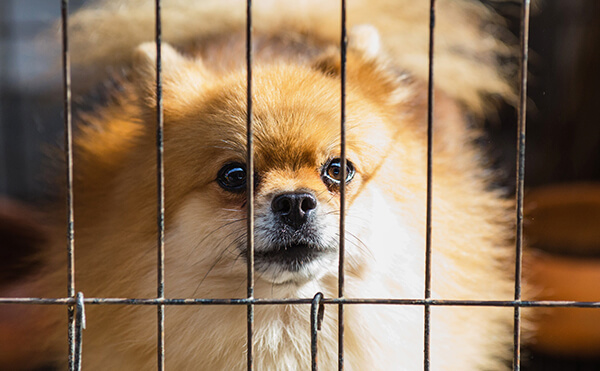
The Stanton Foundation has awarded a grant of $1.98 million to Dr. Candace Croney and her research team to study the welfare of dogs and puppies in commercial breeding kennels. Dr. Croney serves as director of the Purdue Center for Animal Welfare Science (CAWS) and holds a joint appointment as professor of animal behavior and well-being in the College of Veterinary Medicine and professor of animal sciences in the College of Agriculture. The research team includes Dr. Kari Ekenstedt, assistant professor of anatomy and genetics in Purdue Veterinary Medicine’s Department of Basic Medical Sciences, as well as collaborators from the USDA Center for Animal Welfare, Ohio, Florida, and Queen’s University Belfast.
Dr. Croney explains that the long history of mutual dependence between dogs and people, coupled with the important roles dogs fill in society today and the shared bonds between them and their owners, create obligations to protect and consider their welfare. “Given escalating global demands for purebred pet dogs and the role commercial dog breeding plays in meeting such demands, our goal is to promote a culture change in commercial dog breeding so as to support high welfare standards and sustainable pet ownership,” Dr. Croney says. The research team plans to accomplish that goal by generating new scientific knowledge on dog behavior, welfare, and management in commercial kennels and translating it effectively to inform breeders and the greater community about the best practices and policy.
Dr. Croney says in order to facilitate new standards for the care and well-being of dogs in commercial breeding kennels, a better understanding is needed of how to humanely transition dogs out of their breeding careers in high volume kennels and minimize the risk of poor rehoming outcomes. She also says there are many gaps in peoples’ knowledge about the welfare of the dogs that come from commercial breeders and the role of the dam’s (mother’s) welfare status in influencing the behavior, health, and overall welfare of her puppies. “To begin addressing these gaps, the funded studies focus on evaluating whether risk assessment predicts rehoming outcomes in retiring breeding dogs and whether, and to what extent, maternal fear and stress impact liter sizes, puppy health, and behavior,” Dr. Croney says. These studies, in addition to the research team’s previous work, represent the first time researchers are directly examining the welfare of dogs used for commercial breeding on-site at their home kennels. The team also will attempt to determine how well dogs do once rehomed by evaluating their welfare directly and via owner reports.
In addition to studying the dogs, the research team has prioritized outreach and engagement as a means of quickly effecting change. To that end, the team will create extension publications and other avenues for engagement using various learner-centered formats. “New and existing partnerships with dog breeders and pet industry leadership organizations will help us leverage engagement platforms that already exist,” Dr. Croney says. “This will allow us to directly translate the research outcomes to key target audiences, including dog breeders, veterinarians, shelter personnel, and policy-makers. We will also target leaders and other stakeholders within the pet industries and pet keeping communities, and thereby increase our collective impacts. It is particularly exciting that the research generated will add to our understanding of the welfare implications of dog selection, housing, care, and management practices in ways that also benefit shelters and biomedical kennels.”
